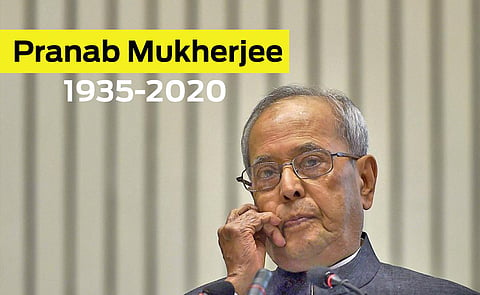

NEW DELHI: As the union finance minister in the summer of 2012, the late Pranab Mukherjee revealed his love for long walks in the morning. “I love to walk in the morning, all by myself and my thoughts,” he said in an interview.
“The President’s House, Rashtrapati Bhavan, has large lawns,” he added rather cryptically. His predecessor, Pratibha Patil’s, term was coming to an end in July and Mukherjee’s comments set tongues wagging in the power corridors of New Delhi.
Was he eying the President’s post? If he were to become the First Citizen of the country, how would his party, the Congress, tide over political and other crises given his reputation as an ace troubleshooter, a go-to man?
The questions swirled but sure enough, he was nominated as the party’s Presidential candidate and with it ended his more than four decades-old political career.
The politician’s politician was an indispensable part of both the Congress and the government but never became Number One. Documenting his disappointment in his book, The Coalition Years (1996-2012), he wrote: “I returned with a vague impression that she (Sonia Gandhi) might wish to consider Manmohan Singh as the UPA presidential nominee. I thought that if she selected Singh for the presidential office, she may choose me as the prime minister. I had heard a rumour that she had given this formulation a serious thought while on a holiday in the Kaushambi Hills”.
Former PM Manmohan Singh, who along with Sonia Gandhi was present at the book release in October 2017, had said: “Pranabji had reasons to feel the grievance, he was better qualified. Well, Pranabji knew I had no choice in the matter or any part in the decision.” All three had a laugh at Singh’s candid confession.
Mukjherjee had everything in his bio to hold the top office. Many cite his trust deficit with the Gandhis, after he fell out with Rajiv for reportedly revealing his ambitions for the highest office post-Indira Gandhi’s assassination. This could have led Sonia to choose Manmohan Singh over him in 2004 as the Prime Minister.
He played a key role in guiding Sonia after she entered active politics in 1998 and over the years both shared a comfortable relationship of mutual respect and appreciation.Mukherjee was awarded the Bharat Ratna, the country’s highest civilian award, in 2019 by the Modi government, fuelling speculation. But he had been a Congressman all his life.
In 2018, he left the Congress red-faced after accepting an RSS invitation to address swayamsevaks in Nagpur. He enjoyed a good relationship with the Modi government during his tenure as the President.
Known as “man of all seasons,” his former party colleagues remember him as an avid reader with vast knowledge of national and international affairs, a photographic memory, mastery of parliamentary procedures, extraordinary drafting skills with knowledge of history.
ALSO READ | RIP Pranab Mukherjee: The PM india never had
He was respected across party lines for being a skilful administrator, able negotiator and possessed a quality to build consensus among disparate political groups in Parliament. For the party, he was the “go-to” man during the UPA regime before he took over as President in July 2012.
Many senior Congress leaders have publicly said the party might have averted the 2014 drubbing had Mukherjee become the PM in 2004.He was elected to the Rajya Sabha five times from 1969 and twice to the Lok Sabha from 2004. He was a member of the Congress Working Committee, the top decision-making body of the party for 23 years.
Born in a small village of Mirati in Birbhum District of West Bengal, Mukherjee’s father was a Congress leader who took part in India’s struggle for independence. Before joining politics in 1969, he worked as a clerk, assistant professor and journalist in Kolkata.
Under the mentoring of Indira Gandhi, Mukherjee’s rise was rapid as he went on to become her most trusted lieutenant. But after her death in 1984, he was sidelined by Rajiv and was not inducted in the cabinet. He was sent back to West Bengal as the state party chief, which saw him forming his own political outfit, the Rashtriya Samajbadi Congress. He merged his party into the Congress in 1989 after a truce with Rajiv.
After Rajiv’s assassination in 1991, he was not inducted into the PV Narasimha Rao cabinet though both were very good friends.